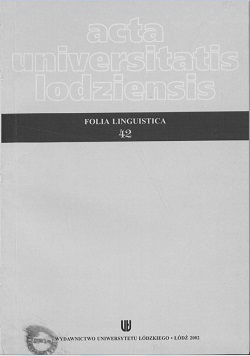The word-formation of personal nouns with suffixes: -(n)ik and -ščik in Russian Language of 17th century
DOI:
https://doi.org/10.18778/0208-6077.42.08Abstract
This article is devoted to the word-formation of personal nouns with suffixes: -(n)ik and -ščik in Russian Language of 17th century. The analysis of the Kotosixin’s memoirs leads to the conclusion that both -(n)ik and -ščik were two of the most widespread suffixes in forming personal nouns according to people’s activities or their distinctive features. What is more, -(n)ik became especially productive in professional names including simple manufacturers, craftsmen and masters. Apart from that, special attention is paid to the contexts illustrating the usage of the derivatives like: горшечник, каретник and their equivalents: горшечного дела мастер, каретный мастер.
Downloads
Downloads
Published
How to Cite
Issue
Section
License

This work is licensed under a Creative Commons Attribution-NonCommercial-NoDerivatives 4.0 International License.










